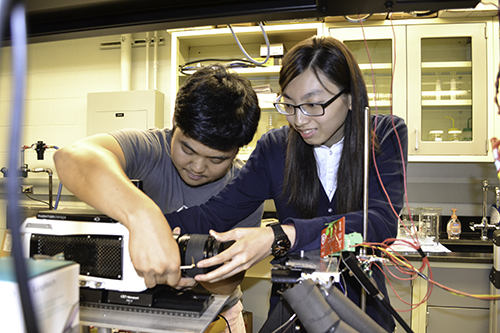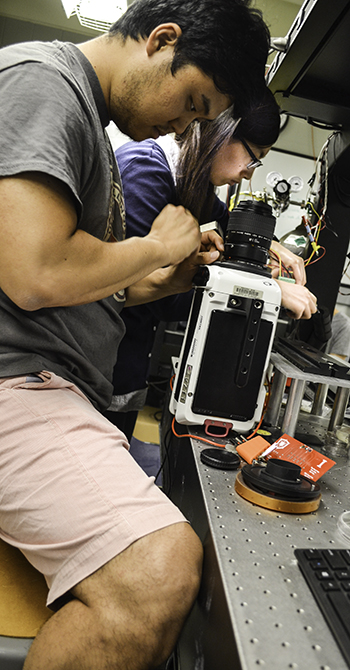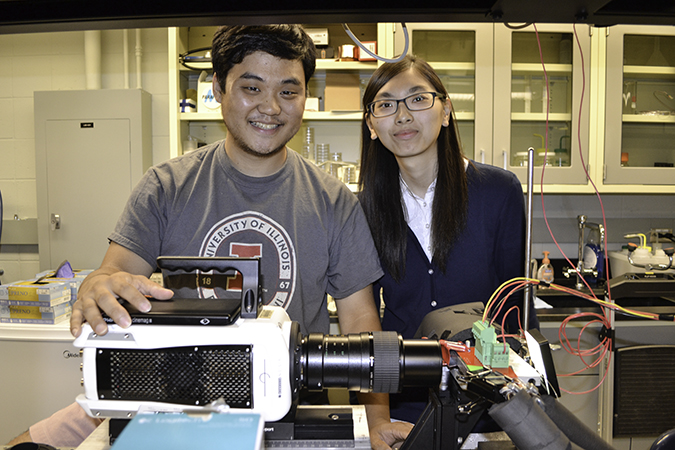POETS REU Helps Illinois Undergrad Sabrina Yin Choose Her Career Path
August 22, 2016
 Sabrina Yin (right) works with her graduate student mentor, Junho Oh, in researcher Nenad Miljkovic’s Energy Transport Research Lab.
Sabrina Yin (right) works with her graduate student mentor, Junho Oh, in researcher Nenad Miljkovic’s Energy Transport Research Lab. Most REU (Research Experience for Undergraduates) participants have an opportunity to conduct research for 8–10 weeks during the summer. Their experience then culminates in a poster session—the highlight of the summer—which gives the undergrad the chance to hone his or her skills while creating a research poster and reporting results. However, POETS REU participant Sabrina Yin, a rising junior majoring in Mechanical Engineering at Illinois, is doing more than just a couple of months worth of research in the summer. Yin began working in researcher Nenad Miljkovic’s Energy Transport Research Lab in March, participated in the REU this summer, and will continue her research in the lab this fall and beyond. “This research project that I’m working on will run for another two years approximately. So I’ll be staying in the lab to help out with the research,” she explains.
“This research project that I’m working on will run for another two years approximately. So I’ll be staying in the lab to help out with the research,” she explains.
One goal of POETS (Power Optimization for Electro-Thermal Systems), an NSF-funded Engineering Research Center, is to contribute to undergraduate retention and to engage underrepresented students via a summer research experiences. However, POETS is also seeking to establish a continuing REU program, which would involve campus undergrads in an ongoing, year-long REU experience—similar to Yin’s experience in Miljkovic’s lab.
Yin says that her research is about “how to utilize jumping droplets condensation on super hydrophobic surfaces to improve thermal cooling for gamma transistors and to achieve higher power density in power electronics.” In layman’s terms, she’s working to provide a solution to keep her (and our) laptop from overheating.
 Sabrina Yin and her mentor, Junho Oh, working in the Energy Transport Research Lab.
Sabrina Yin and her mentor, Junho Oh, working in the Energy Transport Research Lab.Yin, who has not taken courses on fluid dynamics or heat transfer, says she’s definitely learned a lot, and as a user of electronic devices, finds the research to be important.
Yin says, “I just found that application is something that I can relate to very easily. I have a connection with its application. I think it’s important to have an effective thermal cooling system in any device that we use, otherwise it would be prone to premature failure. For example, you don’t want a laptop that is heating up all the time. I definitely learned a lot.”
However, Yin says she plans on taking a course in fluid dynamics next semester. “And since heat transfer is mostly based on fluid dynamics, I’ll be taking a heat transfer course later on.”
So has POETS changed the direction Yin wants to go with her career?
“Probably,” she admits. “I think so. Right now, since I’ve only completed half the ME curriculum, I am still in the process of exploring the area I am interested in, and still looking into the concentration I want to go into for graduate school, so I do think that this research definitely helped me to think about where I should go in the future and career plans as well.”
According to Yin, the research has helped her grow as a student, and to improve her problem-solving skills.
“I think the most important thing that fosters us as undergraduate researchers is that it challenged our critical thinking and definitely improves our problem solving skills,” acknowledges Yin. “Because we are working along with graduate students to solve something or an issue that has not been solved before. The answer is unknown.”
In addition to having her critical thinking and problem-solving skills enhanced, Yin says the experience also prepared her for graduate school.
“Working along with the research team to discover new knowledge, to find new knowledge, it’s an unbelievable experience for us to not only get a taste of what graduate school is like, but also to explore the realms that we have not been before."
Story and Photos by Elizabeth Innes, Communications Specialist, I-STEM Education Initiative
More: Funded, POETS, REU, Summer Research, Undergrad, 2016
For additional articles about 2016 REUs, see:
- 2016 Chemistry REU Offers Undergraduate Students a Glimpse of Grad Life
- Undergrads Consider Nanotechnology Careers Thanks to nano@illinois REU
- Undergrads in Bioimaging REU Experience What Research, Graduate School Is Like
- Wendy Reyes Learns Life Skills—and to Like Research—in Bioimaging REU
- Bioimaging REU's Matt Kavanaugh Experiences Cancer Research at Illinois

Sabrina Yin and her graduate mentor display their work.













.jpg)
















